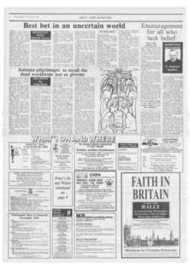Page 2, 26th October 1990
Page 2

Report an error
Noticed an error on this page?If you've noticed an error in this article please click here to report it.
Tags
Share
Related articles
Time To Turn A Revolutionary Clock Back?
Uncle Ronnie's Afraid Of Dominoes
Sandinistas Clash With Church In Nicaragua
Bishop Under Attack By Nicaragua Church
No Change In Coffee Purchases
Nicaraguans' struggle for unity
by Andy Atkins THE church in Nicaragua is as divided as the nation. For the base Christian communities, the defeat of the Sandinistas in February's elections was a severe blow. For the Catholic hierarchy — and particularly for Managua's Cardinal Miguel Obando y Bravo — it was an answer to prayer.
Six crisis-ridden months after President Violete Chamorro took office, her UNO coalition government has entered a process of dialogue with the country's divided social and political forces, designed to bring some stability to Nicaragua. Hopes for a similar dialogue within the church, however, remain unrealised.
According to one priest working with base Christian communities, the divisions between the Catholic hierarchy and the "church of the poor" stem from their opposing conceptions of Christianity and democracy. "We think" says the priest, "that the gospel must be preached while accompanying the poor, and democracy can only be real if it benefits the poor majority.—
The cardinal, on the other hand, he believes, takes the view that the gospel can only be preached under the "democracy we have now".
The cardinal's Sunday morning homilies are broadcast live. They frequently contain thinly veiled attacks on the Sandinistas. The cardinal has been prominent in many recent state ceremonies — although constitutionally he has no right to be there, as there is no state religion. He has selected a number of the new government ministers, including the Education Minister whose highly conservative policies and apparent vendetta against Sandinistas in the education system is causing alarm far beyond Sandinista ranks.
While Cardinal Obando appears ever more assertive, the "church of the poor" has entered a period of evaluation and reflection. For many members, the electoral defeat of the Sandinistas was not only sad, it was profoundly perplexing. They believed that the Sandinista government, despite faults and errors, incarnated more than any previous government in Nicaragua or Central America, concern for the poor, and the desire for social justice, which they regard as central to their own faith.
With its defeat, after ten years of US-supported war, they were left with the question: was their dream of a more Christian society possible in Nicaragua?
The question remains, but the very uncertainty seems to have led many of the "church of the poor" to rediscover and reaffirm the nature of Christian hope. Many appear to be rededicating themselves to the task of building a more just society, not in the certainty that they will succeed, but convinced that the gospel is just and that as Christians they must pursue justice.
Many Christian Sandinistas, now displaced from allconsuming government posts, have examined their own social commitment and recognised that it was through their Christian faith and commitment to the poor that they were led into political involvement in the first place.
Andy Atkins is at the Catholic Institute for International Relations
blog comments powered by Disqus











